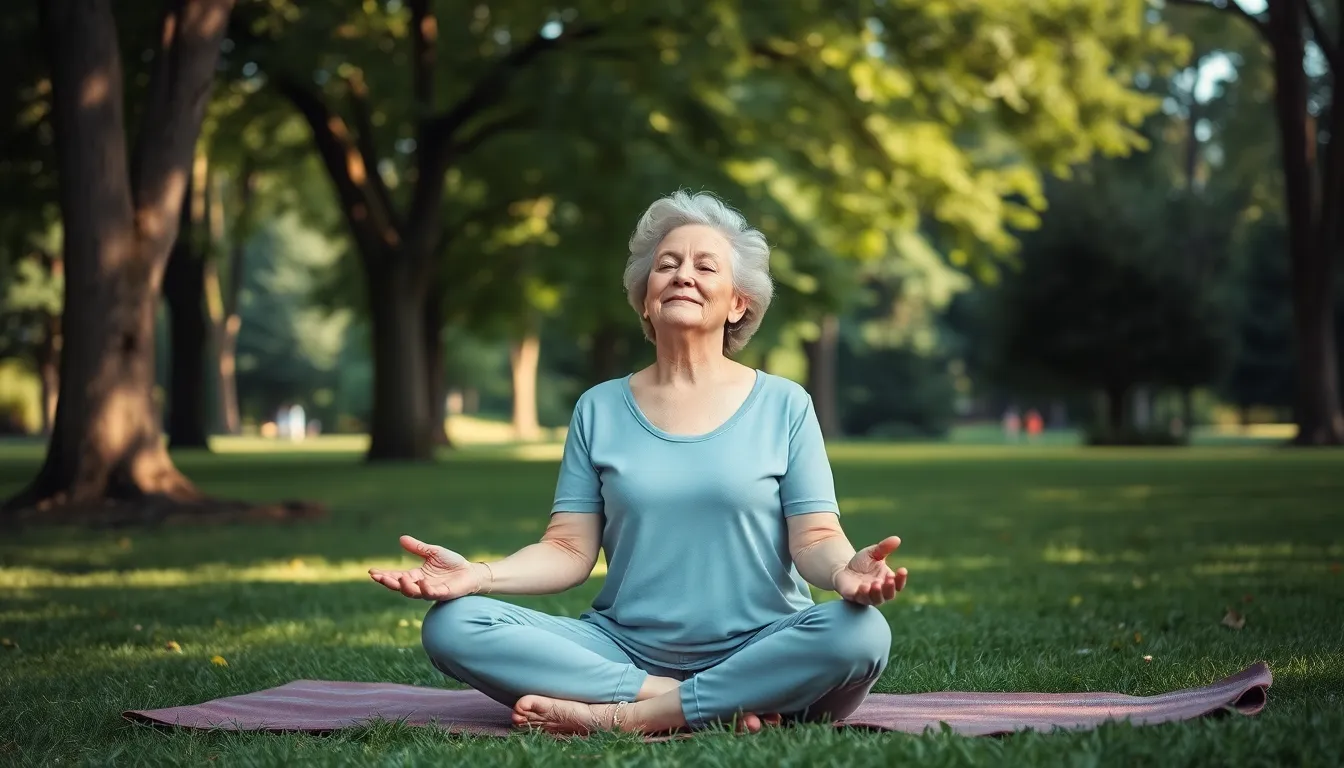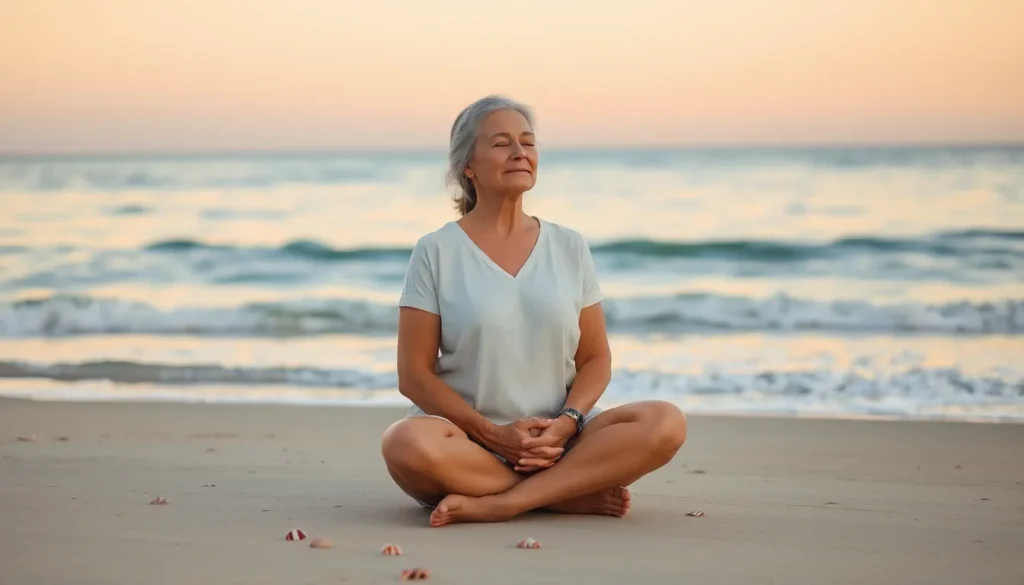Aging might seem like a one-way ticket to creaky joints and forgetful moments, but what if there’s a secret weapon to help navigate this journey? Enter mindfulness, the art of being present and fully engaged in the moment. It’s not just for yogis in funky pants anymore; it’s a game-changer for anyone looking to age gracefully and joyfully.
Table of Contents
ToggleUnderstanding Mindfulness
Mindfulness serves as a vital practice that fosters awareness and presence in daily life. This approach can reshape the perception of aging, emphasizing growth and fulfillment.
Definition of Mindfulness
Mindfulness involves maintaining an open and receptive awareness of the present moment. Practitioners engage with their thoughts, feelings, and sensations without judgment. This concept derives from ancient contemplative traditions and has gained popularity in modern psychology. Mindfulness encourages individuals to observe their experiences as they unfold, facilitating a deeper connection to life and an improved emotional landscape.
Benefits of Mindfulness Practice
Practicing mindfulness offers numerous benefits for mental and physical health. Research indicates that mindfulness reduces stress and anxiety, promoting a calmer state of being. Improved focus and concentration result from regular practice, enhancing cognitive function over time. Emotional resilience also increases through mindfulness, allowing individuals to navigate challenges with greater ease. Regular engagement in mindfulness fosters a more positive outlook on life, contributing to overall well-being during the aging process.
The Connection Between Mindfulness and Aging

Mindfulness fosters a deeper connection between mental well-being and the aging process. Engaging in mindfulness practices can significantly impact psychological health.
Psychological Effects of Mindfulness on Aging
Mindfulness encourages individuals to embrace the present, enhancing emotional resilience. Studies show that older adults practicing mindfulness report lower levels of depression and anxiety. This reduction contributes to improved overall mental health. Practitioners often experience heightened self-awareness, helping them navigate challenging emotions. Engaging in meditation and mindfulness techniques regularly leads to greater cognitive flexibility, aiding in decision-making processes. As a result, a positive mindset emerges, making aging more fulfilling.
Physical Health Benefits
Mindfulness also influences physical health in older adults. Research demonstrates that regular mindfulness practice lowers stress-related inflammation, promoting better immune function. Practicing mindfulness helps improve sleep quality, leading to increased energy levels and reduced fatigue. Additionally, it often encourages healthier lifestyle choices, including improved nutrition and increased physical activity. This shift diminishes chronic health conditions, contributing to longevity. Engaging in mindfulness promotes better management of conditions like hypertension and heart disease, enhancing overall health outcomes. Overall, mindfulness offers a holistic approach to aging, addressing both psychological and physical aspects.
Mindfulness Practices for Older Adults
Mindfulness practices significantly enhance the well-being of older adults. Engaging in these techniques fosters emotional resilience and mental clarity.
Meditation Techniques
Guided meditation sessions empower older adults to cultivate inner peace. Mindfulness meditation encourages focusing on breath and sensations, helping participants remain present. Participants often use body scans to develop awareness of physical sensations, reducing stress. Daily practice, even for a few minutes, can boost mood and mental clarity. Apps like Headspace or Insight Timer provide accessible resources for guided sessions. Community centers now offer meditation workshops to support older adults in developing this beneficial habit.
Mindful Movement Exercises
Mindful movement exercises blend physical activity with awareness. Tai Chi stands out for its gentle motions, promoting balance and flexibility. Participants often experience improved coordination and reduced anxiety through this practice. Yoga also proves beneficial, incorporating stretches with mindful breathing techniques. Local classes cater to older adults, emphasizing safety and comfort during practice. Walking meditations offer another option, allowing participants to focus on each step while enjoying nature’s peace. Engaging in mindful movement fosters a connection between body and mind, enhancing overall physical and mental health.
Challenges in Practicing Mindfulness in Older Age
Mindfulness practice can present unique challenges for older adults. Cognitive declines often occur with aging, impacting memory and concentration. Individuals may struggle to maintain focus during meditation or mindfulness exercises. Shorter attention spans can hinder their ability to engage deeply with practices. Techniques that require prolonged concentration may become increasingly difficult, leading to frustration.
Accessibility issues also play a significant role in mindfulness practice for seniors. Mobility limitations may restrict participation in certain physical activities like yoga or Tai Chi. Older adults might encounter challenges with navigating spaces designed for mindfulness workshops or classes. Additionally, physical discomfort can diminish the enjoyment of mindful practices, deterring some individuals from consistent practice. Adapting mindfulness exercises to accommodate these challenges enhances participation and promotes a more inclusive experience.
Embracing mindfulness can transform the aging experience into one filled with joy and fulfillment. By fostering awareness and presence, older adults can navigate the challenges of aging with greater resilience and positivity. Mindfulness not only enhances mental health but also positively impacts physical well-being, promoting healthier lifestyles and improved quality of life.
As individuals age, adapting mindfulness practices to their unique needs ensures that everyone can benefit from this powerful tool. With the right support and resources, older adults can cultivate a deeper connection between mind and body, enriching their journey through the later stages of life. Ultimately, mindfulness stands as a beacon of hope, guiding seniors toward a more vibrant and meaningful existence.





